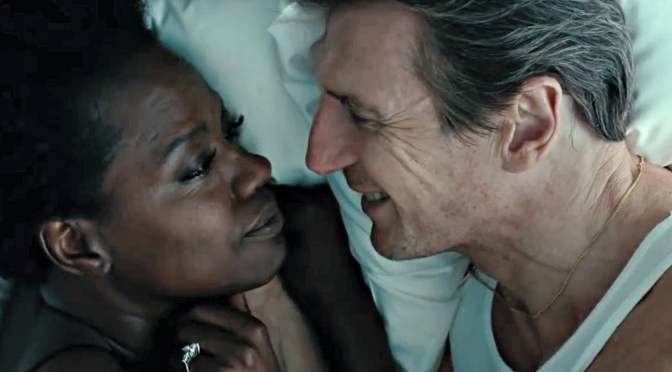★★★★
Imagine a heist film in which the heist itself was conceived almost as an afterthought. That’s not a criticism, mind. No, it is a key selling point for Steve McQueen’s powerful new drama, his first since 2013’s Oscar dominating 12 Years a Slave. Widows is essentially light-hearted by comparison to that tale of slavery but still packs a powerful punch. As for genre, it matters little; in McQueen’s own words: ‘it’s all about the story.’
Widows remakes an ITV drama serial of the same name, created by Prime Suspect wordsmith Lynda La Plante. If eighties television at first strikes as an unusual source for the director of so harrowing a string of features, the striking resonance of the plot – which comes co-penned from McQueen and Gone Girl writer Gillian Flynn – to modern gender swings in Hollywood soon answers the question of how this came about. Liam Neeson’s casting as the armed robber husband of Viola Davis’ Veronica Rawlings feels, for instance, like a rye nod to the increasingly nonsensical action flicks that the actor has only recently given up making. Allegedly. When his Harry is killed early in the film, having been the camera’s initial focal point, Veronica is thrust forward into new criminal directions and a symbolic baton is passed through the glass ceiling.
Davis is, of course, just one among the acting giants leading the film, which plays rather like a grittier Ocean’s 8. It is a thrill to see Fast and Furious star Michelle Rodriguez finally given the opportunity to make good on her obvious talent; here, she plays entrepreneur Linda Perelli, widow of gabbling addict Carlos (Manuel Garcia-Rulfo). Elizabeth Debicki towers as Alice Gunner, who finds new liberation in the wake of losing her abusive spouse Florek (Jon Bernthal), whilst Broadway hit Cynthia Erivo rounds off Veronica’s 4, playing overworked single mum Belle. As the film opens, the quartet are total strangers; as it climaxes, each relies on the other for survival.
Whereas La Plante set her series in the UK, McQueen shifts his version of events to Chicago and a city divided by race, wealth and, subliminally, gender. Male characters get a bad wrap throughout the film, with each defined by their arrogance and some degree of vile misogyny – Veronica is convinced that her gang can pull off the heist because ‘no one thinks we have the balls to do it’. Get it? Against a backdrop of local Alderman elections, the widows’ target is unknown, with Veronica’s only lead being the book of implicating notes that Harry left for her in death, but the need is great. Veronica has just four weeks to find $2 million or face deadly consequences. Daniel Kaluuya is terrific as the insidious enforcer all too keen to carry them out.
A number of implausible twists and dubious happenings lurk beneath the sheen of McQueen’s visual flair but it is a testament to the assembled talent here that these are never to the detriment of a powerful narrative flow. This is a violent, deeply contemporary, near-noirish film and benefits from the beautiful directorial stylisation that one would expect from a former Turner Prize winner. In one fabulously choreographed long take, McQueen positions his camera on the bonnet of the car transporting electoral candidate Jack Mulligan (Colin Farrell), son of outspoken incumbent Tom (Robert Duvall), from one of the poorest districts in Chicago to one of its wealthiest. Soderbergh’s genre offerings were never so socially smart.
La Plante returned to her television show ten years after its conclusion for a reunion sequel called ‘She’s Out’. With a concluding shot in the film witnessing Davis’ dead-eyes softening, perhaps to promise a warmer future, a similar return for McQueen in 2028 would be very much welcome.
T.S.



One of the best openings to a movie I’ve seen all year.
LikeLiked by 1 person
Absolutely!
LikeLike
This review just reinforces my excitement for this film. I can’t wait to see it this weekend when it is finally released nationwide in the UK. Very well written.
LikeLike